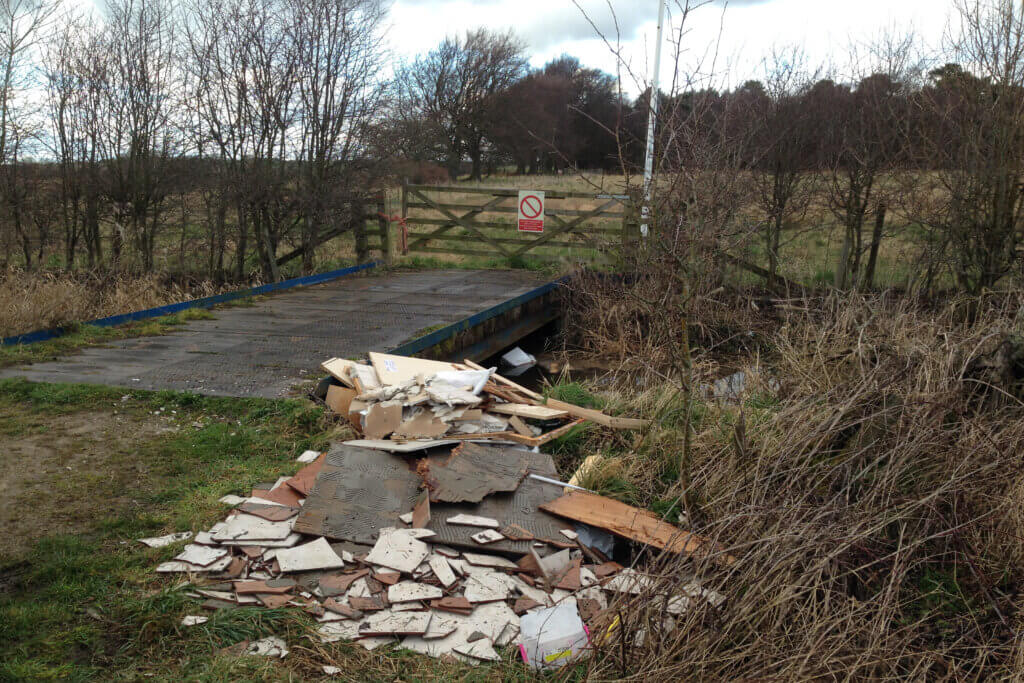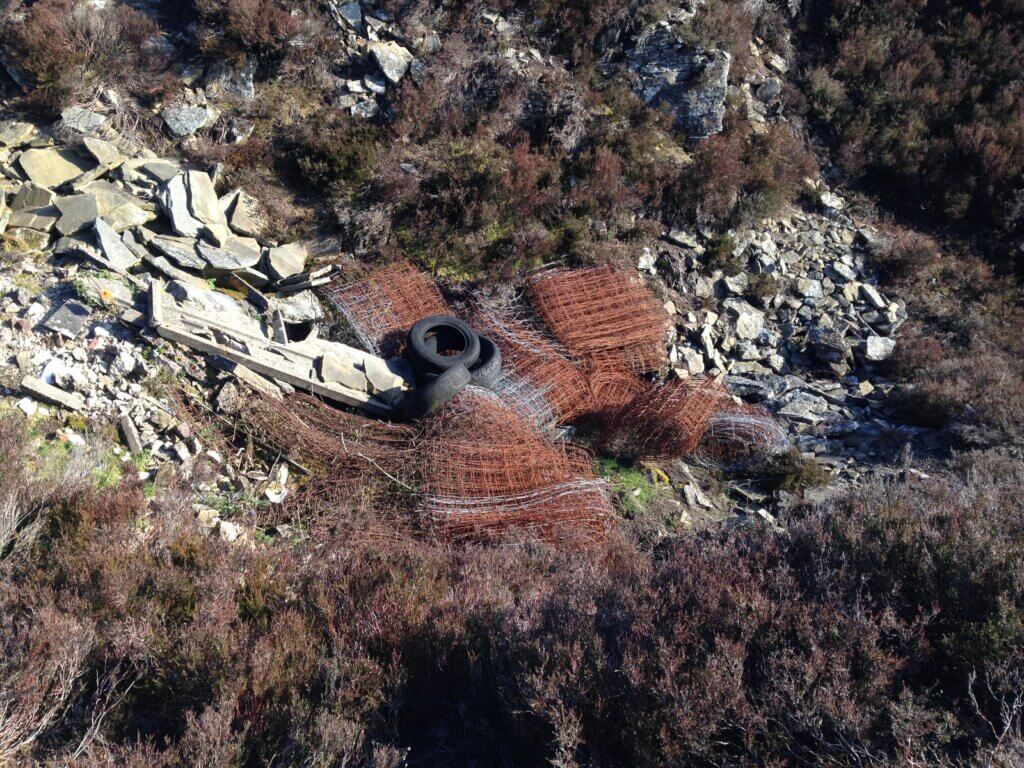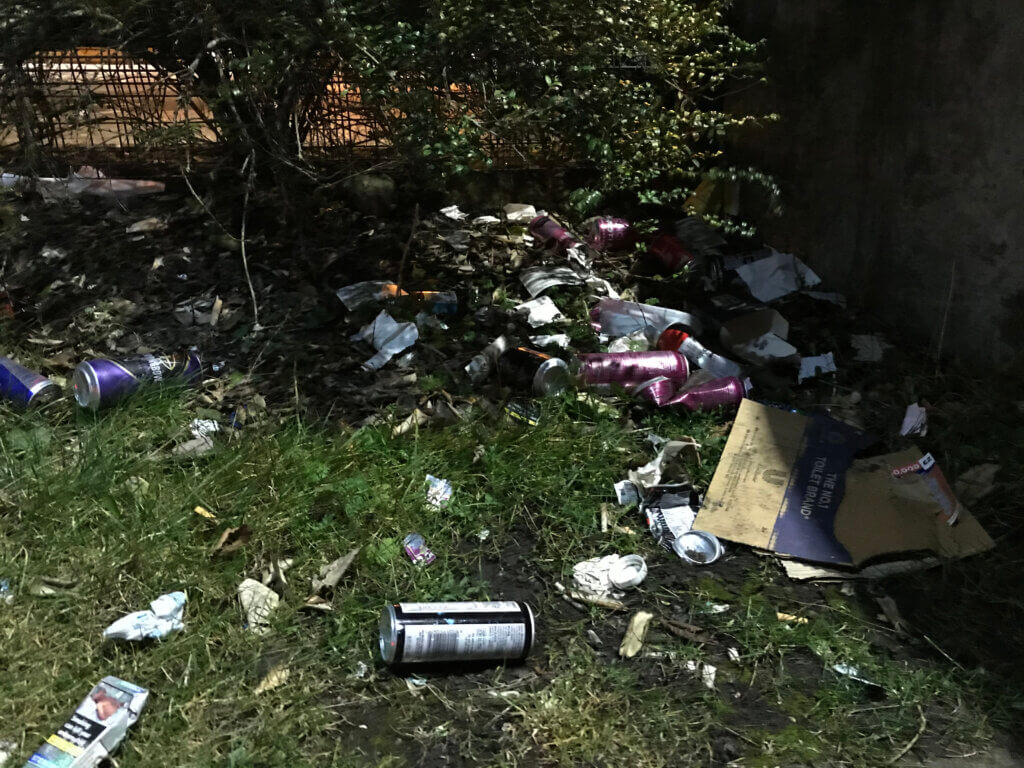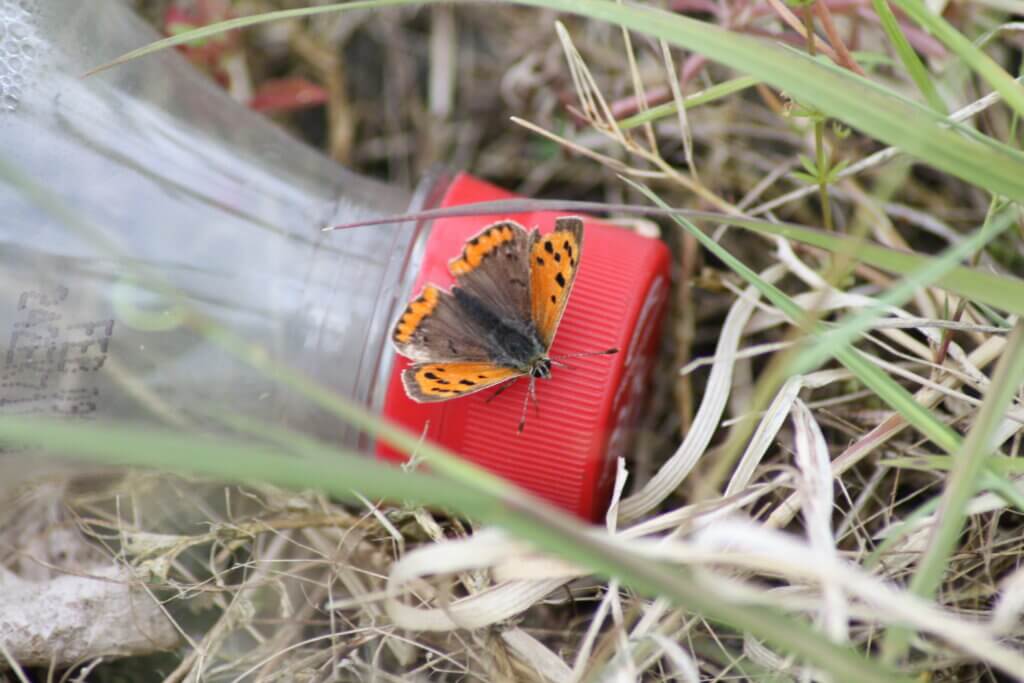
After studying zoology at university Jonathan was involved in ornithological research and conservation for a number of years in France, Scotland and West Africa. Subsequently he has spent most of his career as an environmental consultant, assisting industry in managing its environmental impacts. Wildlife, particularly insects, remain his first love however and he is a keen butterfly and moth recorder and an active member of the North East England Branch of Butterfly Conservation.
Jonathan’s previous guest blogs here can be seen here.

It is something we have all experienced: you are walking in the countryside enjoying the birdsong, the wildflowers and the hum of insects in the sunshine when, suddenly, your idyll is jolted by a small mountain of garbage confronting you. A pile of builder’s rubble, some fridges, a few gas cylinders, a roll of carpet or two and a forlorn old sofa now smother the wildflowers that might once have grown in the space you are looking at. You have come across a case of fly-tipping and it is a widespread and seemingly increasing problem. Around a million incidents were reported by Local Authorities in England in 2019/20 (fly-tips dealt with by the Environment Agency and those cleaned up by private citizens are not included in this figure). Although changes in reporting methods mean that data from prior to 2019/20 are not directly comparable, previous years’ data show a steady year on year increase during the past decade. These figures relate to England but the other parts of the UK also suffer from the problem.

Fly-tipping incidents cover a wide range, from the householder who thinks it OK to tip his lawn- cuttings over his boundary onto the adjacent land, up to large-scale, illegal tipping operations by criminal gangs, but the majority of cases involve household waste and are in the ‘small van load’ to ‘car boot load’ scale. The problem may be most acute in or close to major conurbations (London has by far the worst rate of cases per capita in the country) but nowhere is immune and many a country lane is seen by someone as an ideal place to dump their junk.
How much should we care about this? There are lots of environmental issues facing us – many of which are regularly featured on this blog – and alongside problems like habitat loss, climate change and illegal killing of wildlife, perhaps fly-tipping is unimportant and just an aesthetic issue? Certainly ‘Keep Britain Tidy’ as a slogan sounds very middle class and sub-urban and doesn’t set the pulse racing in the same way as, say, ‘Extinction Rebellion’. Nevertheless, I don’t think that fly-tipping is a trivial problem. First, it costs a huge amount of money to clear it up and that cost is borne by us, the taxpayers, but it is not just a matter of cost.
Licensed landfill sites and other waste disposal facilities are required to implement a variety of measures to manage environmental impacts but no such pollution abatement is applied to fly-tipped waste. Oils and other polluting liquids can leach straight into the soil and from there into ground and surface waters; powerful greenhouse gases can be emitted to the atmosphere from carelessly dumped fridges; plastic blows across the countryside and ends up in our rivers and ultimately the sea. Small mammals become trapped inside bottles and other containers and other wildlife may be variously choked, smothered or entangled. Fly-tipping hot-spots can become significant sources of environmental pollution.

Perhaps, though, the most depressing thing about this is what it tells us about ourselves as a society. The readership of this blog is characterised by a love of wildlife and a commitment to fighting against the different pressures that threaten it, but we should be wary of assuming that everyone shares our passion. Many people are concerned about the build-up of trash in the environment, as evidenced by all the people who regularly participate in beach cleans and the like, but the ubiquity of fly-tipping and its dirty and even more widespread little brother, littering, tells us that there are many others who don’t care at all. Such attitudes presumably reflect a general indifference to the environment: it seems very doubtful that the person who unthinkingly throws his hamburger wrapper from his car window is particularly bothered about the fate of the hen harrier or the hedgehog either.
Of course, to bring about change does not mean we need to get agreement or support from everyone. Fly-tipping and many other environmental problems can be addressed in part by ensuring effective enforcement of the law. This means that we need to target politicians and other key decision makers but we must remember that politicians are most likely to act when they believe there are votes in it and so we do also need to get a lot more people to love the environment and to care about the many ways in which we damage it.

Totally agree Jonathan. I campaign in London on issues such as this and here we have an enormous litter/fly tipping problem. Somehow we need to convert a far larger proportion of the population to the conservation cause, which includes being anti-litter etc. At present we are just a vocal minority. We need to win over a lot more hearts and minds
As a fearless schoolboy cadet in the early 1960s I made the mistake of telling a drunken Irishman that it was wrong to throw his rubbish overboard from the ferry to Northern Ireland. He told me that “the sea is the dustbin of the world”. I was probably lucky not to have been thrown overboard myself. Not that much changes I’m afraid.
“many a country lane”
In this context , include the A34 between the A303 and the A4. I have seen mile after mile of domestic rubbish neatly placed in a tidy line just off the northbound hard shoulder. This is organised tipping on an industrial scale. We don’t need more laws – just enforcement against the perpetrators. By the police – who won’t do it. Sounds familiar?
The A34 tipping was at least thoughfully restricted to the highway and not on farmland – so the clear-up cost impacts the public purse and not the owner/tenant. I used to be sceptical of the clear-up costs quoted in the farming media as they seemed over-egged – but needing to dispose of two sofas some years ago I realised that the costs were not eggsaggerated.
Fly-tipping really is a curse and a blight – thanks JW for highlighting it. The “Keep Britain Tidy Campaign” is 67 years old.
Thanks Filbert. I agree that effective enforcement of existing laws is what is needed, not new laws.
When local authorities changed their policy on vehicles over a certain weight using using recycling centres, It was predicted fly tipping would increase. And it has increased.
The Government needs to speak up against fly.tipping and put decent sums of money towards catching the culprits, hidden cameras for example. If the Government would spend more money on preventative measures instead of trying to remove our rights to demonstrate and protest, life would be a lot better. Unfortunately I don’t think this will happen they are a very mean lot at Westminster and just look after their own come what may.
I have friends in the Fens who experience large dumps of rubbish in gateways and fields on a routine basis.
I live in Galloway where that sort of activity is rarer but, walk down any country lane and you will find “casual littering” from vehicles and bicycles. We regularly walk and collect such detritus locally and the most common article is energy drinks cans, typically Red Bull.
Politicians are very big on telling people at anti litter events how terrible litter and fly tipping is, but this passion seems to evaporate in the wider world. Wouldn’t have anything to do with them not wanting to lose the votes from what they suspect might be a fair proportion of the populace? That would explain why the incredibly insipid and twee anti litter message most of us have been getting for decades now is a joke. If the people carrying out the offence aren’t going to be challenged by it what’s the point? Apparently there’s research which has found teenagers are more likely to use litter bins when they are on their own, they’re actually embarrassed to use them when in a group. I can actually understand that a little (but it’s no excuse) as it was bloody torture to put your neck out at places I’ve worked to ask for better recycling and waste reduction – and on occasion I was indeed laughed at for that. The majority of the anti litter/waste promotional work we’ve endured has been awfully nice and inoffensive and condescending and bloody hopeless, you’re actually fighting against it on the ground.
It took David Attenborough in Blue Planet II to make an impact with showing what plastic waste does to wildlife, treating people like adults who needed to see the raw truth. The wood I visited most when I was a boy should have been a beauty spot, a small ‘glen’ with its own waterfall. It was used as a dumping ground. A friend and I cleared the rubbish that had been getting thrown over a back fence once and found layers upon layers of old mattresses, carpets, toys, broken wheel barrows…it had been going on or decades and it was like Schliemann’s big dig at Hissarlik to find Troy. The dumping is still going on and assume had been going on before I was born. On about three occasions I asked our council if anyone had ever been prosecuted for fly tipping there. I never received an acknowledgement far less an answer so I’m assuming there never has been, in a notorious dumping spot that’s been like that for decades. We need to tell the Wombles to xxxx off, be hard hitting in promotional work and change the law if necessary to make it easier to secure convictions.
I love that comparison to Schliemann’s excavations at Hissarlik, Les! Your experience in your local wood illustrates how easily fly-tipping and littering can be come normalised behaviour. When waste starts to accumulate in a place more and more people seem to become disinhibited from adding their own detritus to the piles.
I can’t even remember my family telling me littering is wrong, I’ve just always hated it especially when I realised how dangerous it was for wildlife. I have twin nieces who are four now, but even when they were two were obsessive about taking any rubbish they had and putting it in the bin, it was incredible to see. The situation in that wood is heart breaking, it really should be a beauty spot and it could be a great place for conservation, but the rubbish just keeps coming in. The mentality behind it, an illegal activity, has never been directly challenged which as a local I can attest to.